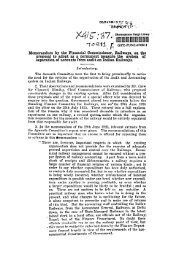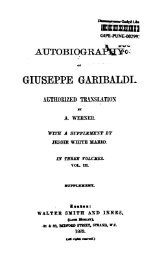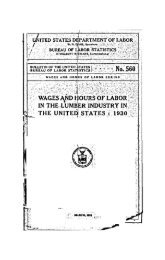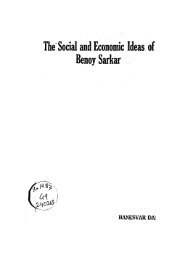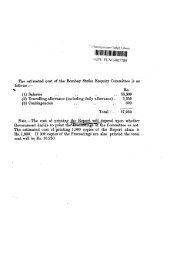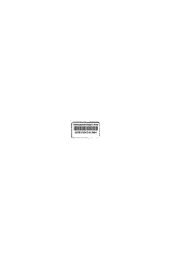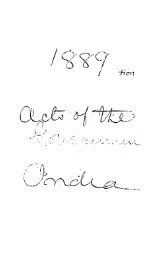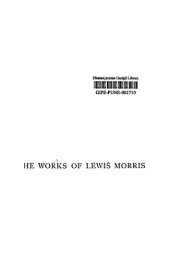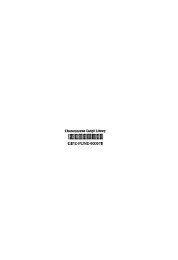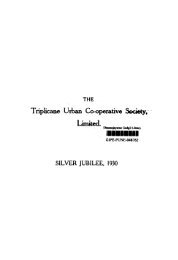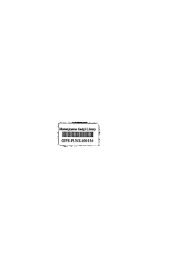You also want an ePaper? Increase the reach of your titles
YUMPU automatically turns print PDFs into web optimized ePapers that Google loves.
Jttdian ~pinion<br />
No. 52~Vol_ XXIII. Friday, December 25th, 1925-<br />
J1eciotend.t tile o.p.o •••• Iir_<br />
Patall FolH!I'RC.II J<br />
. ,-<br />
MR. C. F. ANDREWS IN JOHANN·ESBURG'~·<br />
irUJ':i tolluwins add .. _ WIlQ given in Johannes- 1<br />
II burg at a meeting' ot c1ergy·and·--lait". .0--<br />
December 21st, 1925, and its substance was<br />
altlo delivered at St. Mary's Cathedral after evening<br />
on Snnday. December 20th. It was listened to by<br />
these European audiences with remarkable attention.<br />
"I will begin by repeating what my father, who<br />
was a devout Christian, used to call the Psalm of the<br />
Christian gentleman. It runs as follows:- •<br />
"Lord who shall dwell in thy tabernacle, or who<br />
shall rest upon thy holy hill?"<br />
"EveylClie that leadeth an uncorrupt life; and doeth<br />
the thing which is right ILnd speaketh the truth<br />
from -his.' heart.<br />
"He that hath used no deceit in his tongue, nor<br />
done eVlI to his neighbours; and hath not slandered<br />
his neigliliour.<br />
"Be t.hat setteth not by himself, but is lowly in<br />
his ~yesi and maketh much of them that fear the<br />
Lord. '<br />
~'He ·tbat promiseth unto his neighbour, and disappofntet:b.!<br />
him not; though it were to his own hindraMK",<br />
'''He that hath not given his money upon usury:<br />
nor taken reward against the innocent.<br />
"Whoso doeth these things shall never fall."<br />
In thio pidu,,, ot tbe true gentleman 1 want<br />
especially to note this one verse :-<br />
"lIe that promiseth to hili neighbour and disappointeth<br />
him not, though it were to his own<br />
hindrancJ\."<br />
For my position to-night is, that we who belong to<br />
the British Race and who are Christians, are in<br />
serions danger of doing the very opposite of this verse<br />
towards the Indian neighbour, who is in our midst;<br />
we are in danger of arguing from the immoral principle,<br />
that we are obliged to break our promises to<br />
India, because self-preservation, as a White Race,<br />
must come before anything else.<br />
Let me explain the pOSltion by historical facts,<br />
which cannot be disputed.<br />
When thE' first Indian immigrants came to Natal,<br />
in 18(;0, they were brought out from India at the<br />
special request of the Natal Government under<br />
pressure from the Dnrban Corporation. The desire<br />
WaS so great to keep them in the country, that in<br />
1870 it was t'nacted, that any indentured Indian at<br />
the expiry of 10 years residence in Natal might receive<br />
a crown grant of land instt>ad of his return<br />
passage. The terms on which they came were those<br />
of fnll domicile, with freedo:n to t>l;lgage in agricultural<br />
antI commercial pursuits as soon as their indenture<br />
was ovpr. The Government of India<br />
would not have allowed them under any other conuition.<br />
Mr. J. R. Saunders, speaking before the<br />
Natal Comniission of ISS.!, stated as follows ;-<br />
.. If we look back to 1859, we shall find that<br />
the assureu promise of Indian labour resulted<br />
in an immediate rise of revenue which increasei<br />
mise of renewed Indian immigration,,' and ' u,'p<br />
...again. went.. wages. 'revenue and eaIariee;" :, -<br />
From such contemporary records it. is clear, fhat<br />
Natal was brouglJ,i flom, the verge of banktUptCy<br />
more than once by the supply 'of Indian' indentured<br />
labour. Europeans HOCKed into Natal wnen each<br />
four-fold in a few years. Mechanics found<br />
their wages more than doubled. But, a few<br />
ypurs later, alarm arose lest Indian labour<br />
"ould be suspt:'nded. Simultaneously, down<br />
went revenue ana wages. Then came a protime<br />
of prosperity returned.<br />
' " , '<br />
The Asiatic Enquiry Commill8ion of 1921 adds<br />
another fact which it is n~ to bear in minlC<br />
The indenture system, under which they were<br />
brought out, was very little better than slaveri.<br />
The Lange Report rightly says ;-"It should be emphasised<br />
that there has been very little spontaneous<br />
emigration of the labouring classes from India to<br />
South Africa. They were recruited with difficlllty<br />
and not infrequently by methods which were CODlmonly<br />
known in India as "Coolie catching."<br />
Thn~ these thousands of Indian I3bou""" -{vho<br />
with their desce..ndants ,comprise ,by- far the ~i'<br />
proportion of In.dians in ~outh Afri



